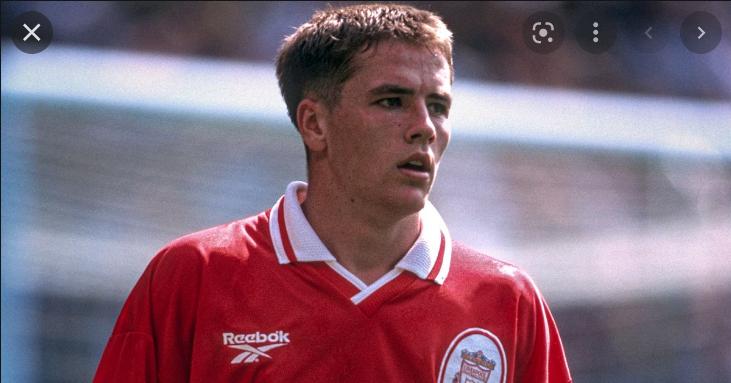Africa-Press – Gambia. Michael Owen came back to Anfield on this day in 2005, playing against Liverpool for the first time since leaving the club.
The Reds beat his Newcastle United side 2-0 with goals from Steven Gerrard and Peter Crouch.
How does Owen’s legacy and time with the club look now in hindsight?
Theo Squires explores…
Time is a great healer, as the old saying goes. In football, it depends who you are.
Fernando Torres effectively ‘downed tools’ at Liverpool before handing in a transfer request to force through a £50m move to bitter-rivals Chelsea in January 2011.
Hated so much because Reds loved him so much, his miserable fortunes at Stamford Bridge along with his return to Anfield for a charity match in 2015 ensured he was eventually forgiven by the majority of the fanbase.
Raheem Sterling is still loathed by some following his £49m move to Manchester City in the summer of 2015, following comments from the then 20-year-old in an unsanctioned interview with BBC Sport, and from his agent, as he turned down a new contract at Anfield before forcing through the move.
In contrast, Luis Suarez effectively went on strike to force through a controversial move to Arsenal in the summer of 2013 yet was forced to backtrack when it became clear his exit wish would not be granted.
Instantly forgiven, he went on to enjoy the season of his life as Liverpool came agonisingly close to winning the title, and there was then limited bad blood despite him infamously biting Giorgio Chiellini at the 2014 World Cup on his way out as he got his desired move to Barcelona.
Yet Philippe Coutinho handed in a transfer request on the eve of the new season before claiming injury when he wanted to join Barcelona in the summer of 2017. Miraculously fit to play for Brazil, he was suddenly unavailable to play again until after the transfer window closed as the Reds managed to keep hold of the Brazilian, before belatedly departing in a club-record £142m deal.
The playmaker now holds a conflicted place in the hearts of Liverpool fans with some eager for him to return to Anfield and others unable to forget.
Javier Mascherano, too, went on strike before leaving for Barcelona in the summer of 2010, while Steve McManaman ran down his contract before departing on a free transfer for Real Madrid in 1999, with the duo arguably now the subjects of apathy in some quarters of the Reds fanbase.
It appears only those true greats that Liverpool supporters feel truly blessed to have seen represent their club are worthy of full forgiveness from the most loyal of fanbases.
Which is what makes Michael Owen’s standing with Reds fans even more intriguing, considering he is arguably the most hated of all former Liverpool players to leave the club in controversial circumstances.
EXCLUSIVE: Liverpool £2m signing tore up contract after two months to win title inspired by Kuyt
TRANSFER PLANS: Jarrod Bowen and Raphinha assessed ahead of summer change
Having come through the club’s academy, perhaps the striker is not as appreciated as he would have been had he been a £20m signing from Atletico Madrid or a £22.7m arrival from Ajax, especially when you consider he won the Ballon d’Or while at Anfield.
A two-time Premier League Golden Boot winner by the age of 19, he was 21 when firing Liverpool to the treble in the 2000/01 season and back into the Champions League.
It is no exaggeration to compare Owen at that time to Kylian Mbappe now. Had he stayed at Anfield, or got his desired return, he could have gone down as one of the club’s greatest ever strikers and maybe even chased down Ian Rush and Roger Hunt’s goalscoring records.
Some would argue his Liverpool record should be enough to cement his place as a club great, but when Anfield already boasts so many legendary figures they idolise, Kopites have no difficulty disowning one who broke their hearts.
Perhaps it is that academy path that ensures his career choices are that much harder to forgive. After all, while not a Scouser, he was one of Liverpool’s own and should have known better.
Owen’s exit story has been told dozens of times and no matter how many times he explains it, Reds fans are still unwilling to forgive and forget.
With just a year left to run on his Liverpool contract, he left for Real Madrid for a paltry £8m plus Antonio Nunez in the summer of 2004 as Rafa Benitez’s side went on to win the Champions League without him.
That alone was enough to turn some supporters against him, a la McManaman, with them taking great pleasure at his expense in their side’s triumph.
Returning to England after just a season at the Bernabeu, the Reds wanted him back but saw their offer blown out of the water by Newcastle United and, with a homesick, young family wanting to return home, Owen felt he had no choice but to move to St. James’ Park rather than force through a return to Anfield.
Clauses in his Newcastle contract would have facilitated a Liverpool return but by now the Reds’ interest was done, with the striker booed upon his return to Anfield with his new side, before a serious injury suffered at the 2006 World Cup would leave him a pale imitation of the striker the Kop once adored.
Suffering relegation with Newcastle in 2009, he left the club at the end of his contact that summer and again tried to persuade Benitez to take a punt on him back at Liverpool. The Spaniard declined.
Left with the choice of Manchester United or Everton, Owen opted for the Reds’ fiercest of foes in search of silverware, committing the ultimate betrayal to Liverpool fans in the process. Now there was no going back.
Whether an opposition player, featuring in charity matches or testimonials or even running out for Liverpool Legends, the boos have followed the striker ever since, despite his desperation to be embraced by his former club once again.
He might have scored 158 goals in 297 appearances for the Reds, firing them into the Champions League, helping them win the treble and single-handedly turn an FA Cup in Liverpool’s favour, but for supporters, there are far too many black marks against his name.And not even his mixed fortunes since leaving Anfield in 2004, resulting in premature retirement with Stoke City at the age of 33, were enough to heal old wounds.
At other clubs, his C.V. would be enough to earn him a statue and earn him guaranteed status as a legend. But that ship had long since sailed from Liverpool, even before Owen started shaking hands with Sir Alex Ferguson, holding aloft Manchester United scarves and donning Red Devils shirts.
Owen has repeatedly tried to explain his Liverpool exit and reiterate his efforts to return, at the expense of his already destroyed relationship with Newcastle fans, but no matter how many times he tries to win back the affections of Reds, he remains the modern legend without a home with none of his former clubs’ fans wanting to embrace him as their own.
And it all stems back to that one decision in the summer of 2004 when Real Madrid came knocking, ensuring Liverpool and Owen would never be on the same path again.
Admittedly the striker was never embraced to the extent of local hero Robbie Fowler, despite both coming through the Reds’ academy, with there often being a suspicion that he was England’s striker rather than Liverpool’s having become an overnight sensation as a result of his wonder-goal against Argentina at the 1998 World Cup.
“Mo never had the same rapport with the Kop as his striker partner at the time, Robbie Fowler,” former team-mate and close friend Jamie Carragher reflected in his autobiography, published in 2008.
“It’s too simplistic to say this was because of Robbie’s Toxteth roots. The ‘problem’ for Mo was he became an England legend before a Liverpool one. He won the hearts of the nation before he won those of the Kop.
“At eighteen he was described as the future of English football and was immediately linked with the top Italian and Spanish clubs. Liverpudlians, unconcerned about England’s fortunes and uneasy their players being seen as others’ property, felt distant towards Michael.
“First they never related to him, then they never wanted to try. It wasn’t Mo’s fault he was so good so soon, and it was his brilliance for Liverpool which so swiftly earned him an opportunity for his country, but the supporters remained suspicious of his priorities.
“When he left for Real Madrid in 2004 some said it proved their misgivings were fair, but that’s too cosy an argument. They never appreciated the Michael I know so well, who for as long as he was my team-mate was one of those I knew would never give less than 100 per cent, and who was as devastated by defeats as I was.”
Celebrated when winning and scoring but perhaps treated more harshly when the Reds were in rut, Owen’s standing among supporters was never as sturdy as it perhaps should have been following his return from France ‘98.
“By the summer I would be 12 months away from being out of contract, so inevitably there was constant chatter about whether I would be staying at Anfield after the summer of 2005,” the striker wrote in his first autobiography in 2004, published when already out of date less than a fortnight after his move to the Bernabeu.
“The rumour mill starts like this: a report appears saying, ‘Michael Owen still hasn’t signed a new contract’; then everybody gets it into their heads that there’s some kind of delay and the issue gets analysed endlessly, even if the negotiations haven’t even started.
“Partly because the team was performing so badly, the speculation started incredibly early in the campaign. Liverpool came to me around Christmas and said, ‘we’d like to talk to you about your new contract’, but we didn’t have our first meeting until April. So I had five months of people having a go at me, calling me disloyal or saying I was waiting to see if we made it into the Champions League.
“By the end of the season it seemed as if I had been ‘holding out’ for an eternity, but it was only because the speculation started way before we actually sat down for our first set of talks. Prior to our last game of the season, we had just the one get-together, and our second was straight after the season ended.
“I didn’t point out any of this at the time because it’s advisable not to stoke the fires. If I had said, ‘I’ve only had one meeting’, it might have looked bad on Liverpool’s part for not dealing with it earlier, or bad on my part for not getting it sorted out. I was having to take it all on the chin and not respond.
“We had already decided among ourselves that we were going to deal with the issue properly in the summer. I had to bite my lip and take an awful lot of abuse. We were never in any rush, and Liverpool always knew I wouldn’t walk out on them on a Bosman free transfer in 2005.
“I shook the manager’s hand and assured him that we wouldn’t drag it out, that we would get something resolved in the summer, and everyone was happy with that.”
Owen continued: “Never once did I walk into Anfield and say, ‘either we reach the Champions League or I’m off’, or demand they buy such and such a player, or else. Ridiculous. The manager makes the personnel decisions and the chairman gives him the money to spend. That is nothing to do with me. I just play.
“Obviously I felt we needed to strengthen, because finishing 30 points behind the champions Arsenal was an enormous gap. But I would never make those threats or put pressure on the people responsible for those decisions. It’s not my style..
“Naturally I don’t appreciate being accused of disloyalty. It didn’t sit too well when I picked up the tone in the local papers or heard fans questioning my commitment on radio phone-ins.
“If that’s what everybody thinks, then sod it. What more do I have to do to show my loyalty to Liverpool Football Club? But then you come to your senses. Well it’s only one moron out of how many millions of people who support the team… It can damage the bond you have with them.
“I don’t mind if someone calls me a rubbish player or says I haven’t done this or I haven’t done that. But the word ‘loyalty’ really sets me off. I am as loyal as they come… I’m a loyal lad who wants to be successful. When people do question me as a human being or doubt my loyalty, it hits below the belt.”
For More News And Analysis About Gambia Follow Africa-Press






